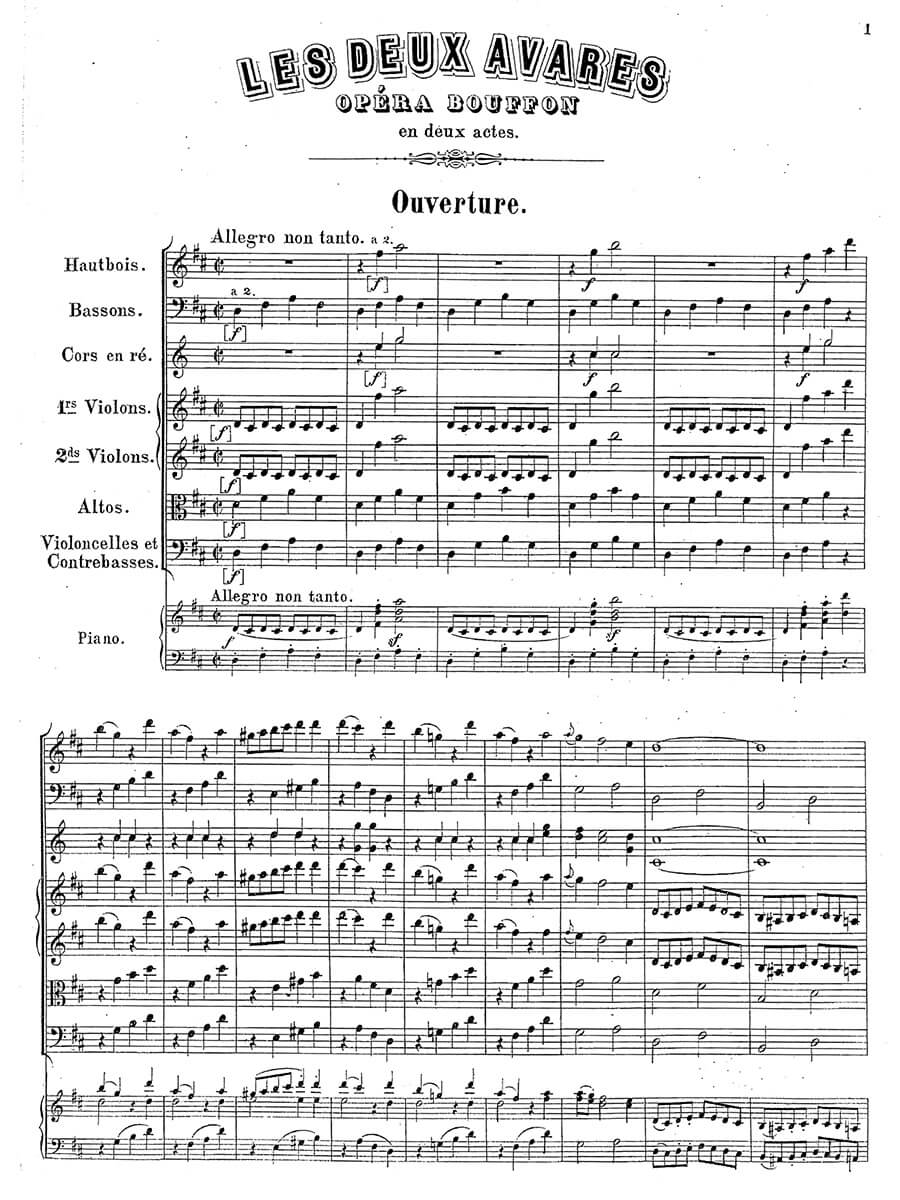Les deux Avares (full opera score in two acts with French libretto)
Grétry, André
46,00 €
Preface
André-Ernest-Modeste Gretry – Les Deux Avares
(b. Liège (Belgium) February 8, 1741- d. Montmorency (France) September 24, 1813)
Preface
„If hell does not know this kind of torture, it could adopt it to punish bad musicians“, says André-Ernest-Modeste Grétry about his work on the chorus of the Janissaries from the French-language opéra comique in two acts “Les Deux Avares”, in English “The two misers” or “Everyone takes a risk”.
Grétry came into contact with music from an early age, as he sang as a choirboy, received harpsichord and composition lessons and perfected his musical skills from 1760 to around 1766 in Rome. Then he went to Geneva, where he worked as a music and composition teacher. In 1767, on the advice of Jean-Jacques Rousseau (1712-1778) and Voltaire (1694-1778), he travelled to Paris, where he was very successful with his opéra comiques. This genre includes folksy pieces from the vaudeville genre as well as opera parodies. Style-defining elements were the alternation of spoken dialogues and sung numbers. Grétry composed a total of around seventy opéra comiques, but he fared like many pioneers of new ideas, „who for posterity fell into the shadow of those for whom they paved the way.“1 Grétry was the favorite composer of the French Queen Marie Antoinette (1755-1793 ). The opera presented in this volume is dedicated to Louis-Marie Duke of Aumont (1732-1799).
„Les Deux Avares“ was written for Marie-Antoinette’s marriage to Louis XVI, which lasted more than a year. The libretto was written by the French author and playwright Charles-Georges Fenouillot de Falbaire de Quingey (1727-1800), who worked full-time in the French financial administration.
Around 1770, while he was working on the composition of his opera „Les Deux Avares“, Grétry was seriously ill and dependent on the care of his wife and his mother, who had rushed over from Liège. In his memoirs, Grétry reports in more detail about his health situation and his work with the Janissary Choir: „I never have heard the Janissary Choir ‘Ah! qu’il est bon, qu’il est divin!’ (‘Oh! how good he is, how divine he is!’) without much pain. The anguish I went through while composing this piece is the reason for this. Bouts of violent fever, which had plagued me for more than a month, had brought me to the brink of the grave when the author of ‘Les deux Avares’ came to me. He was told that I was in very poor health; but as it was I who had suggested the writing of this work, he slipped a sealed letter under my pillow, advising me not to open it until my health was restored. Everyone knows the anxiety that a locked object causes. I opened it behind my bed curtains and found in it the chorus of the Janissaries, which the author considered necessary for his play and which he asked me to set to music as soon as possible. I obeyed. Immediately I was working on it – against my will. I hoped, after ridding myself of this burden, to find the rest I so badly needed; but no: the fear of forgetting again what I had just invented haunted me for four days and nights. I heard the choir with all its voices. In vain did I tell myself that it was impossible to forget it, in vain did I dwell on something else to distract myself, in vain did I delve into the details of a score, saying to myself: The violins will play this sequence of melodies, the Bassoons amplify those notes, horns may or may not do so, etc., etc. – after a few minutes, a devilish orchestra began again, ‘Ah! qu’il est bon, qu’il est divin…’ My brain was like an axis around which this piece of music turned incessantly, without my being able to stop it. If hell doesn’t know this kind of torture, it could adopt it to punish bad musicians. To keep myself from falling into a deadly delirium, I felt I had no choice but to write down what was on my mind. I asked my servant to bring me some sheets of paper. My wife, who was lying on a sofa next to me, awoke and thought I was gripped by a delirium similar to what I had had a few days before. I had trouble convincing her of the agony of my situation and the gain I hoped to get from this work. I completed the score surrounded by my mute family, after which I returned to my bed and found calm again. After a slumber that was as long as it was healing, the most beautiful awakening undoubtedly helped speed my recovery.“ …
Read full preface / Das ganze Vorwort lesen> HERE
Score Data
| Edition | Opera Explorer |
|---|---|
| Genre | Opera |
| Size | 210 x 297 mm |
| Printing | Reprint |
| Pages | 224 |
